

Responsible E-Waste Management Insight. Basel Convention > Countries > Status of Ratifications > Ban Amendment. Please see article 17 (5) of the Convention which reads as follows: "Instruments of ratification, approval, formal confirmation or acceptance of amendments shall be deposited with the Depositary.
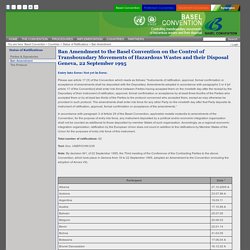
Amendments adopted in accordance with paragraphs 3 or 4 [of article 17 of the Convention] shall enter into force between Parties having accepted them on the ninetieth day after the receipt by the Depositary of their instrument of ratification, approval, formal confirmation or acceptance by at least three-fourths of the Parties who accepted them or by at least two thirds of the Parties to the protocol concerned who accepted them, except as may otherwise be provided in such protocol. The amendments shall enter into force for any other Party on the ninetieth day after that Party deposits its instrument of ratification, approval, formal confirmation or acceptance of the amendments.”
Notice of Decision to grant a permit to Powercell (Australia) Trading Pty Ltd to export waste batteries to Japan. In Developing World, A Push to Bring E-Waste Out of Shadows by Mike Ives: Yale Environment 360. 06 Feb 2014: Report by mike ives Nitin Gupta has a penchant for garbage.
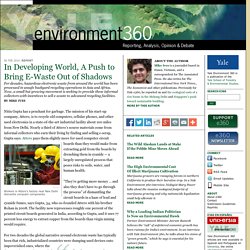
The mission of his start-up company, Attero, is to recycle old computers, cellular phones, and other used electronics in a state-of-the-art industrial facility about 100 miles from New Delhi. Nearly a third of Attero’s source materials come from informal collectors who earn their living by finding and selling e-scrap, Gupta says. Attero pays them slightly more for used computer circuit Attero Workers in Attero's factory near New Delhi dismantle computer components. boards than they would make from extracting gold from the boards by drenching them in cyanide — a largely unregulated process that poses risks to soils, water, and human health.
"They’re getting more money … and also they don’t have to go through the process" of dismantling the circuit boards in a haze of lead and cyanide fumes, says Gupta, 34, who co-founded Attero with his brother Rohan in 2008. Notice of decision to grant a permit to Sterihealth Pty Ltd to import clinical waste to Laverton North from New Zealand. Notice of Decision to grant a permit to Geocycle SBF Pty Ltd to import solvent waste from New Zealand. Pursuant to Section 33 of the Hazardous Waste (Regulation of Exports and Imports) Act 1989, notice is given that on 21 August 2015, permit AUS15-046 was granted to Geocycle SBF Pty Ltd (ACN 072 838 209), 92 Ordish Road, Dandenong, Victoria, 3175 (Telephone + 61 4 0279 1245; Facsimile + 61 7 3335 3227).
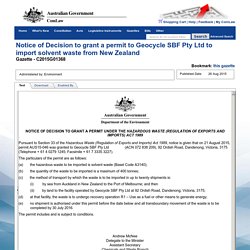
The particulars of the permit are as follows: Notice of Decision to grant a permit to Geocycle SBF Pty Ltd to import waste pesticides from New Zealand. Pursuant to Section 33 of the Hazardous Waste (Regulation of Exports and Imports) Act 1989, notice is given that on 21 August 2015, permit AUS15-042 was granted to Geocycle SBF (ACN 072 838 209), 92 Ordish Road, Dandenong, Victoria, 3175 (Telephone + 61 4 0279 1245; Facsimile + 61 7 3335 3227).
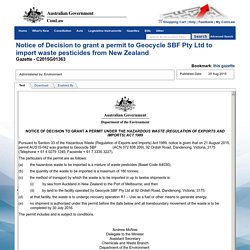
The particulars of the permit are as follows: Notice of decision to grant a transit permit to Metalman New Zealand Limited to transit used lead acid batteries through Brisbane en route from New Zealand to the Republic of Korea. Pursuant to section 33 of the Hazardous Waste (Regulation of Exports and Imports) Act 1989, notice is given that on 1 September 2015, transit permit number AUS15-044 was granted to Metalman New Zealand Limited, 1 Rangi Road, Takanini, Auckland 2105, New Zealand (Telephone: +64 9 274 4567; Facsimile: +64 9 274 8567).
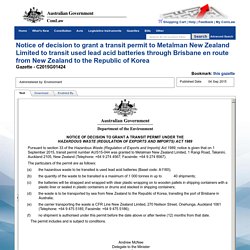
The particulars of the permit are as follows: (a) the hazardous waste to be transited is used lead acid batteries (Basel code: A1160); (b) the quantity of the waste to be transited is a maximum of 1 000 tonnes in up to 40 shipments; (c) the batteries will be strapped and wrapped with clear plastic wrapping on to wooden pallets in shipping containers with a plastic liner or sealed in plastic containers or drums and stacked in shipping containers; Notice of Decision to grant a permit to Powercell (Australia) Trading Pty Ltd to export waste batteries to Japan.
ComLaw: Gazettes - All - by Portfolio. 1-s2.0-S0048969712009217-main. 1-s2.0-S2214999614003208-main. Figure 1 Potential Hazardous E-waste Exposures Figure 2 Desired flow diagram for ESM of used EEE within a recycling facility.
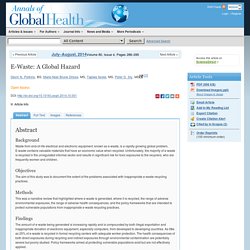
Abbreviations: EEE, electrical and electronic equipment; ESM, environmentally sound management. Background. Ewaste.pdf. The Dark Side of the Digital Age: E-Waste E-Waste via Basal Action Network With the passing of Earth Day, I am left with the usual examination of areas in my life where I could possibly improve and be more eco-friendly.
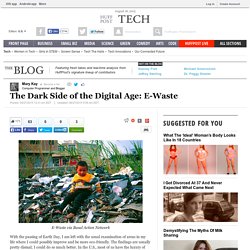
The findings are usually pretty dismal; I could do so much better. In the U.S., most of us have the luxury of not having to face the daily realities of all the damage humans do to the planet. It is hard to understand the devastation we create unless you travel to a developing nation or actively try to find it in our own country -- pictures or words will never do it justice. I am definitely not well informed on all the issues that face the environment, but when I hear about something new, I try to learn and do better -- such is the case with the issue of e-waste. E-waste Recycling: Your Questions Answered.
What is electronic waste?
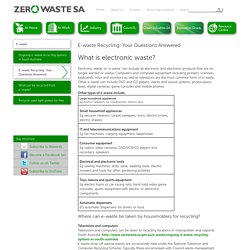
Electronic waste, or 'e-waste' can include all electronic and electronic products that are no longer wanted or useful. Computers and computer equipment including printers, scanners, keyboards, mice and monitors as well as televisions are the most common form of e-waste. Other e-waste can include DVD and CD players, stereo and sound systems, photocopiers, faxes, digital cameras, game consoles and mobile phones. Hazardous Waste (Regulation of Exports and Imports) Act Australia. About the Act The main purpose of the Hazardous Waste (Regulation of Exports and Imports) Act 1989 (‘the Act’) is to regulate the export and import of hazardous waste to ensure that hazardous waste is disposed of safely so that human beings and the environment, both within and outside Australia, are protected from the harmful effects of the waste.
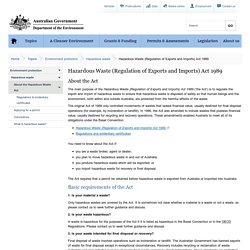
The original Act of 1989 only controlled movements of wastes that lacked financial value, usually destined for final disposal operations (for example, by incineration or landfill). In 1996, the Act was amended to include wastes that possess financial value, usually destined for recycling and recovery operations. These amendments enabled Australia to meet all of its obligations under the Basel Convention. You need to know about the Act if: The Act requires that a permit be obtained before hazardous waste is exported from Australia or imported into Australia. ZWSA WASTE STRATEGY 11.12.11.
ChristopherHansard.pdf. Waste to Resources Policy 2010. Knudsen_Laura_Final_Ewaste_Report.pdf. Ewaste.pdf.